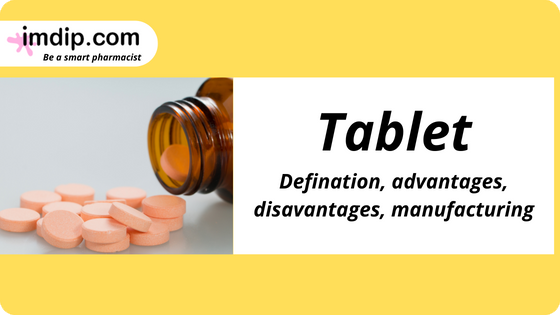
Definition of Tablet:
Tablets are solid dosage forms, containing active drugs and excipients. Normally tablets are prepared by the compression method. It's a unit dosage form.
Advantages of Tablet:
- Tablets are easy to administer, which means it's easy to swallow.
- Greatest dose precision and the least content variability.
- A sustained-release product is possible by various techniques.
- Objectionable odor and bitter taste can be masked by various techniques.
- Tablets are suitable for large-scale production.
- Packaging and handling are easiest and cheapest than other dosage forms.
- Greatest chemical and microbial stability overall oral dosage form.
- Product identification is easy and rapid requiring no additional steps
- When employing an embossed and/or monogrammed punch face.
Disadvantages of Tablet:
- Tablets are not suitable for those patient's who lying on the bed or in unconscious state.
- Children or some elderly can't swallow tablets properly, it's also a disadvantage.
- Drugs with poor wetting and slow dissolution properties may be difficult or impossible to formulate and manufacture as a tablet that will provide adequate of full drug bioavailability.
- Bitter tasting drugs with an objectionable odor or drugs that are sensitive to oxygen may require encapsulation entrapment prior to compression or the tablets may require coating. In such cases, the capsule may offer the best and lowest cost approach.
- Patients with vomiting and diarrhoea cannot take it or absorb it.
- Some drugs cause gastric irritation when they are given in the tablet form.
Tablet Preparation Methods:
There is three methods of preparation of tablets:
- Dry Granulation Method
- Wet Granulation Method
- Direct Compression Method
Before going to understand in detail of these three methods of tablet preparation, you must have clear knowledge of granulation technique.
So the question is
What is granulation?
We can say that granulation is a technique to make adhere(or sticking) of small particles of ingradients by bond togerther to form a large aggregates. This aggregates or small lumbs are called as granules.
Hope you clearly understand.

Dry Granulation Method
Dry granulation method is that method of tablet preparation, where no liquid is used for the preparation of granules.
In this method dry powders are compressed by Slugging method or Roller compaction mehod.
Slugging Method
This is a method where drug and excipient powder perticles are compressed by tablet pressing machine. Then the slug is formed after that breaks the slugs and create granules (most commonly used Hammer mill).
Roller compaction mehod
In this method mixed powder (API + excipient) crush between two counter rotating rollers to form a compressed and flat sheet, these sheets are break into flakes and finally the flask are broken into granules.
Limitation of Dry Granulation Method-
- Require heavy duty equipment
- Process of dry granulation causes dust which might cause contamination
- Tablet formulated by this method are tend to be soft so breaking of tablet can be the problem
Wet Granulation Method
This is the most widely method used in Pharmaceutical Industry and granules are produced by messing of API and excipient with a suitable solvent with or without the addition of binder. Dough is formed and screening of wet mass (dough) is done by using a suitable sieve. Then the granules are dried in oven.
Granules are ready to convert into tablet.
Limitation of Wet Granulation Method-
- Time consuming method
- Not suitable for moisture sensitive ingredients
- Not suitable for heat sensitive ingredients
Direct Compression Method
In this method the API and excipient are mixed and compressed directly there is no need.
Basically three methods are involved for tablet formulation-
a) Milling of API and Excipient
b) Mixing of API and Excipient
c) Tablet compression
Limitation of Dry Compression Method-
- Poor flow of power
- Problem in uniform distribution of low dose drug
- Problem of cracking, layering etc are more observed with this method.














.png)
